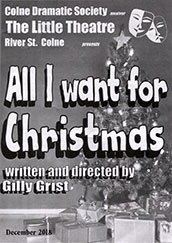Association of Community Theatre

ALL I WANT FOR CHRISTMAS
by Gilly Grist
Directed by Gilly Grist
Colne Dramatic Society
 Seeing an unknown play for the first time can sometimes be demanding as the reviewer will have no prior knowledge of what to expect. It does make one concentrate, however, and this production by Colne Dramatic Society was no exception. As a background to the play I can do no better than quote the author and director’s notes included in the programme.
Seeing an unknown play for the first time can sometimes be demanding as the reviewer will have no prior knowledge of what to expect. It does make one concentrate, however, and this production by Colne Dramatic Society was no exception. As a background to the play I can do no better than quote the author and director’s notes included in the programme.
She writes: “As a mother of now grown-up children, I had plenty of first-hand experience at my disposal for the writing of All I Want for Christmas. In its original form, the play concentrated on the trials, strains, comedy and the frustrations within two families' lives as they join to become one.”
“The Porter-Green Diaries (its working title) was completed initially in 2014: the play was then in diary form. However, it was modified into a drama, and then, solely as a result of a comment made by my then young teenage daughter, it changed into something very different. The play was re-written twice, developing the drama through those comedic stresses, and becoming a story that follows the hopes and fears of each family member over the period of a year, as they deal with something that could quite easily destroy the family unit completely. It is not, therefore, about what each character hopes is sitting under the Christmas tree, wrapped in shiny paper, teasing the recipient until the moment it is opened. It is about the struggle of getting through the festive season, and what is left when the trimmings come down.”
The staging of the play was a simply furnished living room with the ubiquitous magnolia painted walls on which were hanging a picture of Mum and her two children, and two festive streamers with tinsel and Christmas cards, indicating the season at the opening of the play.
A quite unusual change from the normal exposition of a play was the use of a voice over (by Steve Grist) giving the thoughts of the various players and thus setting the overall theme of the play. Very well done.
Playing the pivotal roles of mother with her second husband were Pauline Shalliker, as Jane Porter, and Sam Green, played by Riz Riley. The angst-ridden Jane, and work-obsessed Sam, were strongly and convincingly played, as the tension within this family structure was beginning to be laid bare. Teenage children with loud music playing in their bedroom, and no reliable internet connection was a very telling recipe for heightening tensions between all members of this family unit. And so it was here. Jane’s two children, Rosie (Leah Walsh) and Jack (Leighton Hunt) were typical teenagers, always right, self-obsessed, but fiercely protective of each other and of their mother. Sam’s daughter, Penny, (Mollie Thompson) was very typical of a teenager wanting the bright lights of show-business. The delight on her face as she revealed she had been accepted onto a course at LIPA was just as one would expect. It was quite telling that, despite her outward signs of being in control of her emotions, she didn’t seem to get the idea that she was quietly being dumped by her boyfriend. We were only aware of him as a result of her constant telephone calls with him, and which always were cut short by him. One felt like saying to her, “You have been dumped!”.
There was a brief visit from Jane’s father, Rupert Franks, played by Ken Horsfield. Deaf as a post, or so he claimed, selective hearing was the order of the day with him and he certainly proved to be a free spirit, determined to live life to the full, even to the extent of taking a new wife who might prove to be many years younger than him.
Over the course of the play, we were made aware of underlying problems, questions which were never really answered but nonetheless, were a part of the dynamics of this family unit. Was Jane a one-time alcoholic, was Sam having an affair at the office?
The time span of the play was one year, Christmas to Christmas, during which time the family unit was to be split with the two girls leaving to pursue their own lives, and Jack buckling down to learning. Jane and Sam were realising that there was more to life than the office and were beginning to get close to each other instead of living for their work.
I am sure that Gilly must be delighted with seeing her work brought to life to create this very interesting night at the theatre.
There was a very strong line-up of incidental music used within the play, all of which was original and written by Riz Riley, Wayne Vermaak and Mark Hicks, with songs by Lily Fontaine.
It turned out be a fascinating theatrical experience, a new play, new, for me, performers, and new music. Very many congratulations to everyone involved with this production.